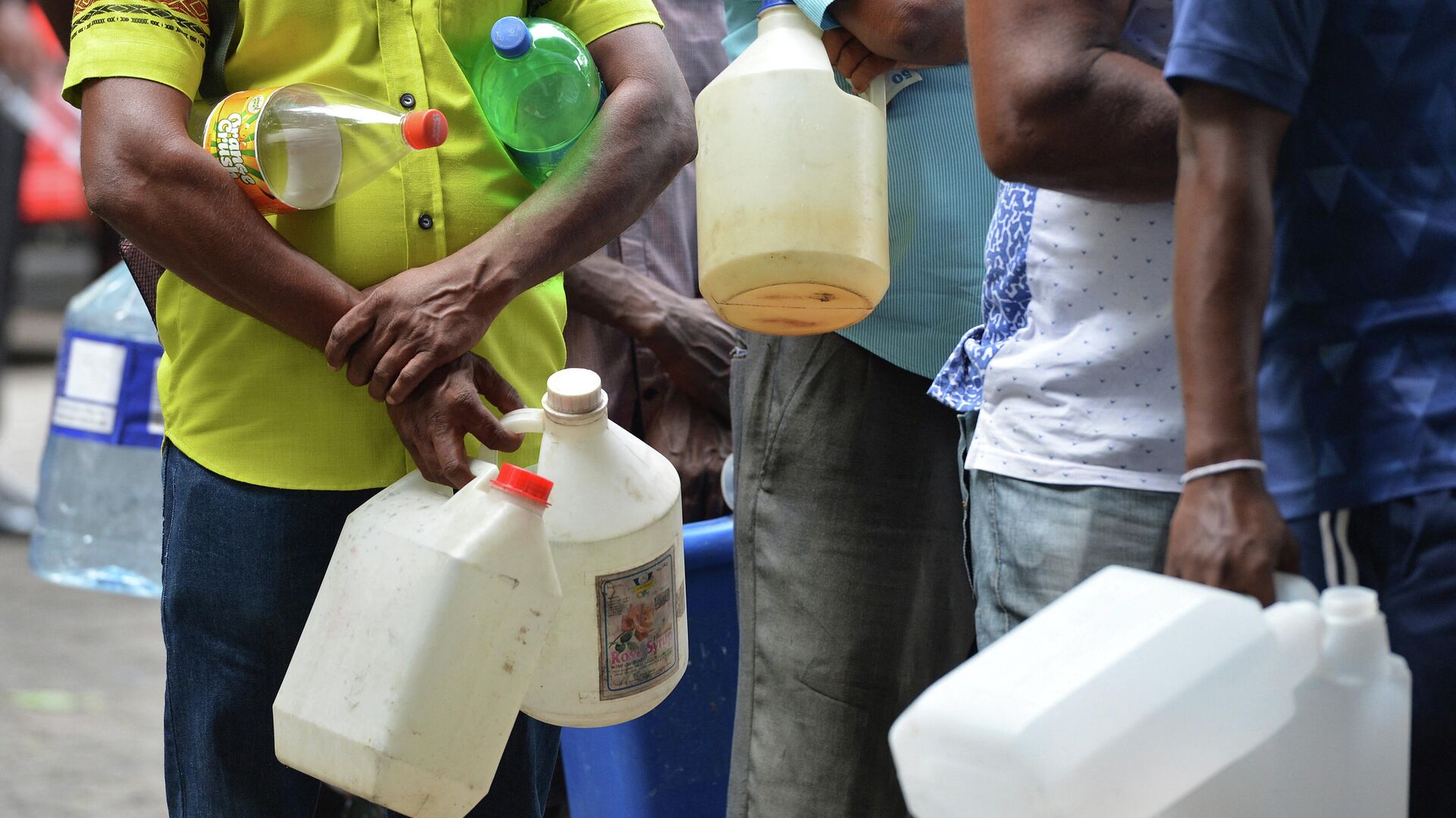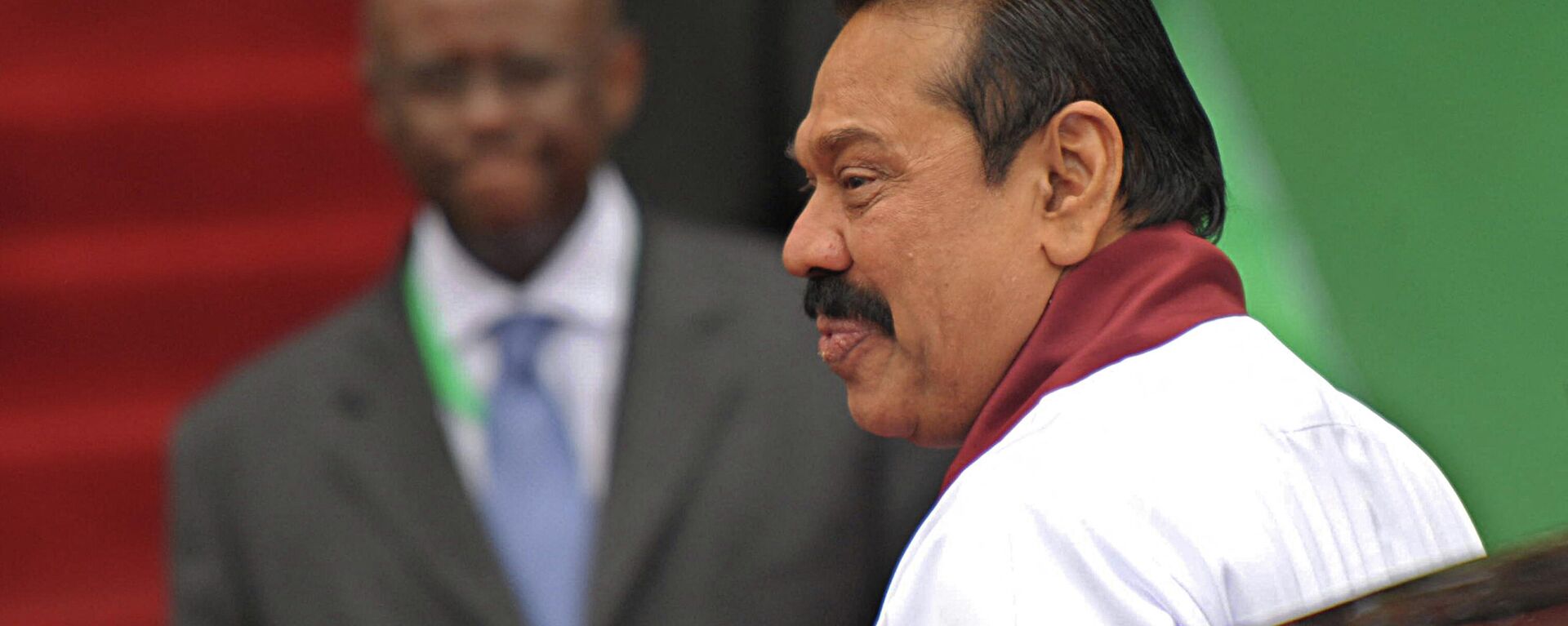https://sputnikglobe.com/20220711/videos-cars-form-mile-long-lines-at-gas-stations-for-days-in-sri-lankas-colombo-1097200252.html
VIDEOS: Cars Form Mile-Long Lines at Gas Stations for Days in Sri Lanka's Colombo
VIDEOS: Cars Form Mile-Long Lines at Gas Stations for Days in Sri Lanka's Colombo
Sputnik International
COLOMBO, Sri Lanka (Sputnik) - In Colombo, Sri Lanka's commercial capital, cars formed mile-long lines at gas stations while waiting for an opportunity to... 11.07.2022, Sputnik International
2022-07-11T16:55+0000
2022-07-11T16:55+0000
2022-07-11T16:56+0000
sri lanka
fuel
political crisis
economic crisis
https://cdn1.img.sputnikglobe.com/img/07e6/07/0b/1097199243_0:0:3509:1973_1920x0_80_0_0_9688482d11db805e639d0e81a33c5eca.jpg
Mile long lines at many gas stations in Colombo are mostly formed by tuktuks (three-wheeled auto rickshaw serving as taxi). People wait for several days, in some cases up to five days, for the opportunity to refuel. Tuktuk owners from time to time literally live and sleep in their rickshaws, local residents told the correspondent.Colombo was rocked by massive protests this past weekend, caused by public dissatisfaction with the slow pace of the government's fight against the economic crisis. Lanka Indian Oil Company, the only private corporation running gas stations in Sri Lanka, announced a two-day halt in supply operations on Friday, ahead of the planned protests and resumed fuel supplies to its filling stations on Sunday.The correspondent noted that not all gas stations resumed their operation and people queuing up all day may not fill up their cars at all.Sri Lanka is now facing a major political and economic crisis considered the worst since gaining independence in 1948. In mid-April, Sri Lanka defaulted on its external debt for an interim period, pending a restructuring of the obligations under an IMF-supported economic adjustment program. The recession is attributed to ineffective government policies and foreign exchange shortages caused by a clampdown on tourism during the COVID-19 pandemic. It left the country unable to buy enough fuel, with people facing an acute scarcity of food and basic necessities, heating fuel, and gas. Many regions suffer from power outages.
https://sputnikglobe.com/20220711/sri-lankan-president-is-in-neighboring-country-will-return-on-wednesday-reports-suggest-1097187491.html
sri lanka
Sputnik International
feedback@sputniknews.com
+74956456601
MIA „Rossiya Segodnya“
2022
Sputnik International
feedback@sputniknews.com
+74956456601
MIA „Rossiya Segodnya“
News
en_EN
Sputnik International
feedback@sputniknews.com
+74956456601
MIA „Rossiya Segodnya“
Sputnik International
feedback@sputniknews.com
+74956456601
MIA „Rossiya Segodnya“
sri lanka, fuel, political crisis, economic crisis
sri lanka, fuel, political crisis, economic crisis
VIDEOS: Cars Form Mile-Long Lines at Gas Stations for Days in Sri Lanka's Colombo
16:55 GMT 11.07.2022 (Updated: 16:56 GMT 11.07.2022) COLOMBO, Sri Lanka (Sputnik) - In Colombo, Sri Lanka's commercial capital, cars formed mile-long lines at gas stations while waiting for an opportunity to refuel for several days, a Sputnik correspondent reported on Monday.
Mile long lines at many gas stations in Colombo are mostly formed by tuktuks (three-wheeled auto rickshaw serving as taxi). People wait for several days, in some cases up to five days, for the opportunity to refuel. Tuktuk owners from time to time literally live and sleep in their rickshaws, local residents told the correspondent.
Colombo was rocked by massive protests this past weekend, caused by public dissatisfaction with the slow pace of the government's fight against the economic crisis. Lanka Indian Oil Company, the only private corporation running gas stations in Sri Lanka, announced a two-day halt in supply operations on Friday, ahead of the planned protests and resumed fuel supplies to its filling stations on Sunday.
The correspondent noted that not all gas stations resumed their operation and people queuing up all day may not fill up their cars at all.
Sri Lanka is now facing a major political and economic crisis considered the worst since gaining independence in 1948. In mid-April, Sri Lanka defaulted on its external debt for an interim period, pending a restructuring of the obligations under an IMF-supported economic adjustment program.
The recession is attributed to ineffective government policies and foreign exchange shortages caused by a clampdown on tourism during the COVID-19 pandemic. It left the country unable to buy enough fuel, with people facing an acute scarcity of food and basic necessities, heating fuel, and gas. Many regions suffer from power outages.


